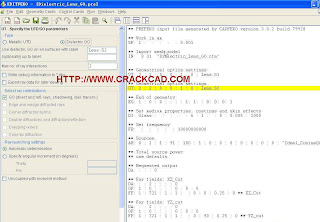
FEKO Suite 5.3
Major highlights include
* OPTIMISATION: Complete re-design and re-implementation of the optimisation process and workflow.
* NON-RADIATING NETWORK ANALYSIS: A general network implementation for the inclusion of multi-port S- Z- and Y- parameter-based networks.
* Geometrical Optics (GO): A new implementation for the analysis of electrically large dielectric bodies e.g. dielectric lens antenna.
User Interface
* Stand-alone command-line driven tool for CAD model re-evaluation and meshing.
* POSTFEKO GUI available on the 64-bit x86_64 platform.
* Selective importing from existing CADFEKO models.
* GID mesh import.
Kernel
* Geometrical Optics for dielectrics: A new method is available for the analysis of large dielectric structures, particularly for lens antenna applications.
* General non-radiating networks: Multiple cascaded general multiport networks (based on S- , Y- and Z- matrix representations) may be included in the FEKO model. Current interaction is taken into account at the network-geometry connection points.
* Fast near-field calculations for the MLFMM: Dramatic reduction in time required for computation of the near-field at many points for large models.
* Waveguide port excitation available on models that include dielectric parts: Available for MoM/SEP or FEM models or where the CFIE (combined field integral equation) is used on metallic objects.
* UTD extended: Provision for connection of multiple plates at a single edge.
* Support for the indexed point-arrays in EDITFEKO: Expansion to allow for point-array and variable-array based definition of polygon and polygonal plate geometry primitives in scripted geometry definitions with no limitation on the number of points used.
Improved parallel MLFMM efficiency: Run-time improvement due to load balancing and improved parallel communication schemes.
* Improved memory allocation on 32-bit Windows operating systems: The maximum memory allocation has been expanded by modification of the Windows DLL handling code.
Licencing
* Extension of the concept of a ”preferred” licence to node-locked licences.
*
Provision for the usage of a node-locked licence on a computer when network / nameserver access is not available: When a licence file containing mixed floating/node locked licences is used, network access is no longer required.
 Software training,tutorials,download,torrent
Software training,tutorials,download,torrent